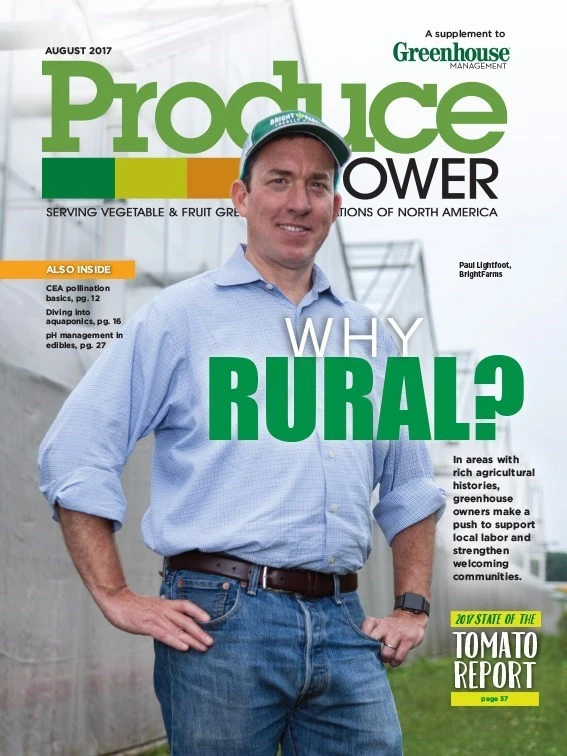
In Dickson, Tennessee, located in the middle of the state approximately 40 miles west of Nashville, an enterprising father and son team are ramping up operations at their home lettuce facility. Named after the son, owner Zach McClung, ZMac Farms produces up to 10,000 heads of fresh lettuce a month, and sells it to local restaurants and the Dickson Farmers Market.
In 2015, Kevin McClung says he and his son built the 6,000 square-foot double-tunnel greenhouse, which they bought from CropKing. Since 2016, the duo has been selling a wide variety of lettuce — red and green bibb, red and green oak, romaine, chicory, arugula and Bok choy — as well as microgreens.

Getting the greenhouse off the ground
Prior to opening ZMac Farms with Zach, Kevin grew tomatoes, peppers and cucumbers in a 24-by-30-foot greenhouse using several growing methods. “I used drain and ebb on my tomatoes and drip for my peppers, and a raft deep water technique for my lettuce,” he says.
Although he has experience hydroponically growing produce in a greenhouse, Kevin is a pharmacist by trade. “I’ve owned my own pharmacy for, golly, 12, 13 years,” he says.
In a way, Kevin says his entrepreneurship has influenced Zach. “He’s seen the advantages of being your own boss,” he says. ‘You can make decisions and go with them, whether they’re right or wrong, but you don’t have someone else telling you what to do.”
Zach attended college for a couple years, and then he decided he wanted to follow a different path, Kevin says. The duo traveled to Lodi, Ohio, for a three-day grower’s workshop with CropKing, and Zach completed a several-week internship in South Carolina.
“He found it rewarding to grow food for people,” Kevin says of his son. “That’s a good thing.”

Where the lettuce leads
At local restaurants, ZMac Farms’ lettuce is valued high, and customers ask specifically for it, Kevin says.
The grower also works with Nashville Grown, a local food hub that distributes food growth within 100 miles, he says. Chefs from dozens of restaurants in Nashville come pick out what they want. “They say, ‘Okay, I want four cases of green Bibb from this guy, and I want 20 pounds of tomatoes from this guy,’ and these are all from maybe 20 or 30 different suppliers,” Kevin says.
Although ZMac Farms produces up to 10,000 heads of lettuce a month, it has decided not to partner with a major grocery chain to avoid issues with having to rent or purchase a refrigerated truck and drive it to a faraway distribution center, and then wait days for it to finally reach its destination.
“Our theory is, if you keep your food miles on a particular product under 40 miles, you’re helping everybody,” Kevin says. “Number one, you’re getting better food — the consumer’s going to get better food, fresher food, and cheaper food, because you’re not paying for diesel — it helps the local farmer, and it helps the local economy — it helps everybody.”
In the next few years, Kevin imagines people will more commonly build communities around food sources, instead of having food shipped to them from outside the community.
Lettuce lessons
After building their greenhouse and opening ZMac Farms, the McClungs have learned the benefits of running a high-tech operation.
Kevin says he is impressed by the setup of CropKing’s greenhouses. “It takes all the guesswork out,” he says. “Computers do everything. They calculate your nutrient solution, the pH of the water, the humidity in the greenhouse, the heat in the greenhouse, the air flow, the oxygen levels.”
In the winter when the greenhouse is closed up, the plants produce high levels of oxygen, so Kevin says he and Zach use ancillary carbon dioxide burners.
Another seasonal trend Kevin has noticed is the timing of customers' lettuce cravings. “It’s like everybody’s circadian rhythms say, ‘It’s spring, we’re supposed to eat green things,’ just like our ancestors did, like ‘Let’s do it!’” he says.
Growing year-round in a controlled environment has clear advantages, including more calculable yields, Kevin says. “We sell a lot in the beginning of spring, and our business continues and it slows off a little bit because of — we’ll call them the ‘dirty dirt farmers’ — will put out lettuce,” he says. “They’ll have lettuce for, golly, two or three weeks until it gets so hot the lettuce just bolts — it bolts like crazy when it gets hot. And then, from then on, we’ve got the lettuce the rest of the year.”

Explore the August 2017 Issue
Check out more from this issue and find your next story to read.
Latest from Produce Grower
- TIPA Compostable Packaging acquires paper-based packaging company SEALPAP
- Divert, Inc. and General Produce partner to transform non-donatable food into Renewable Energy, Soil Amendment
- [WATCH] Sustainability through the value chain
- Growing leadership
- In control
- The Growth Industry Episode 8: From NFL guard to expert gardener with Chuck Hutchison
- 2025 in review
- WUR extends Gerben Messelink’s professorship in biological pest control in partnership with Biobest and Interpolis





